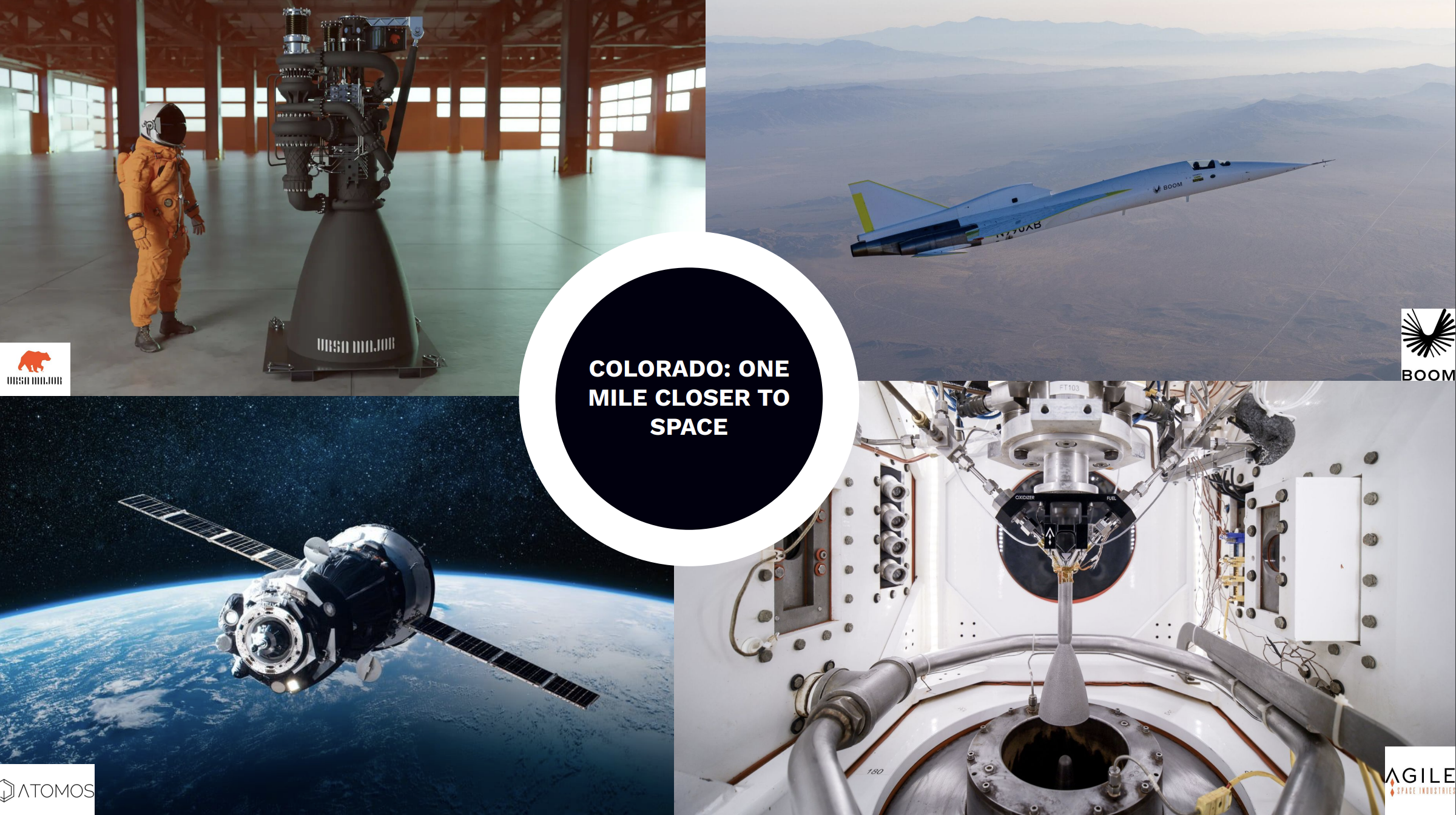

This week I attended the Colorado Space Economy talk, monderated by Brad Bernthal of Silicon Flatirons.
Via Denver Startup Week: “Starting with an overview of how universities, government initiatives, and public sector partnerships bolster Colorado’s position in the space economy, this session features insights from founders about the state’s emerging leadership in SpaceTech. It explores the exciting developments happening now and how Colorado’s innovative spirit, strong government ties, and research initiatives are driving its leadership. Discover how Colorado is making its mark in today’s space economy and explore the opportunities that lie ahead.”
Discussion participants:
- Cody Moore – Caruso Ventures (Caruso Ventures post)
- Matt Shieh – Canopy Aerospace
- Brad Bernthal – Silicon Flatirons Center
- Chris Pearson – Agile Space
- Rachel Kelley – Radia
Key takeaway:
Colorado is a great place for aerospace, space, and defense technology development and venture investment, and business development powered by the close proximity of manufacturing, scientific innovation, and military dual use support.
Colorado Aerospace Discussion Notes1:
Keynote – Cody Moore
Colorado is rapidly emerging as a leading hub for the space economy, with significant growth and a robust ecosystem that includes startups, major aerospace firms, and educational institutions. The state’s unique positioning, both geographically and economically, has made it an attractive environment for innovation and investment in space technology. The sector’s potential mirrors the explosive growth seen in the telecom and fiber industries of the 1990s, with projections indicating a $1.8 trillion global space economy within the next decade. Colorado’s infrastructure, talent pool, and proximity to key defense and aerospace institutions make it a critical player in this expanding field.
1. Exponential Growth of the Space Economy: Colorado’s space economy is expected to grow in tandem with the global space market, projected to reach $1.8 trillion in the next decade. Investment and M&A opportunities are drawing increasing attention, akin to the telecom boom of the 90s.
2. A Thriving Ecosystem of Space Companies: Colorado hosts a broad range of aerospace and space technology companies, from established giants like Lockheed Martin and Sierra Space to scaling startups like Lunar Outpost. The state’s supportive ecosystem, with key customers, universities, and research institutions, fosters innovation and growth.
3. Talent Attraction and Retention: The state is a magnet for high-skilled talent, particularly in aerospace engineering and space technology. Universities like CU and CSU produce top-tier talent who are eager to remain in Colorado due to the quality of life and professional opportunities, further strengthening the space industry’s foundation in the region.
Panel Discussion
The panel discussion on the Colorado space economy highlighted the significant role the state plays in advancing space innovation, talent acquisition, and industry growth. The speakers explored the unique geographical advantages that Colorado offers, particularly with its highly concentrated aerospace ecosystem and collaborative culture. They emphasized how the local talent pool, strategic partnerships, and funding opportunities have bolstered the space sector’s expansion. The discussion also touched on the evolving nature of the space industry, including the shift from traditional top-down approaches to more agile and collaborative methods that incorporate startups and scale-ups.
1. Geographical Advantage of Colorado: Colorado’s aerospace cluster is a key factor in its space industry success. Proximity to top universities, research institutions, and aerospace companies creates a synergy that accelerates innovation. The panelists stressed that geography matters in terms of talent recruitment, customer access, and collaboration with local companies on technical and regulatory challenges.
2. Collaboration Across the Ecosystem: The state’s space ecosystem benefits from close-knit relationships between companies, universities, and government agencies. The panel highlighted the increase in collaborative efforts in recent years, particularly among startups, scale-ups, and established primes. This collaborative spirit has led to faster problem-solving and has fostered innovation in areas like regulatory compliance, manufacturing processes, and technology development.
3. Shift in Industry Dynamics: Over the past decade, the space industry has transitioned from rigid, top-down processes dominated by large defense primes to a more dynamic and collaborative environment. Companies like SpaceX have driven this shift, compelling traditional players to adopt more agile approaches. The industry has become more open to partnerships with smaller firms, fostering a spirit of innovation and speed in both commercial and military space applications.
4. Funding Opportunities and Regional Investment: Colorado’s funding landscape has evolved, with local investors showing increased interest in aerospace ventures. The discussion emphasized that while venture capital is traditionally concentrated on the coasts, Colorado is seeing growth in local investment initiatives. This, combined with federal programs like the Small Business Innovation Research (SBIR) grants, is helping startups secure the funding necessary to scale.
5. Technological Innovation and Space Sustainability: The panel also explored critical technological advancements emerging from Colorado’s space sector, including innovations in propulsion systems and sustainable space operations. Companies in the region are working on technologies that address key challenges such as space debris management and environmentally friendly rocket fuel, underscoring Colorado’s contribution to global space sustainability efforts.
In summary, the panel reinforced Colorado’s critical role as a hub for space innovation and collaboration. The state’s strong ecosystem of talent, strategic partnerships, and investment is fueling growth in both commercial and defense space sectors.














- Notes produced with iOS 18 voice notes transcription and ChatGPT. ↩︎
